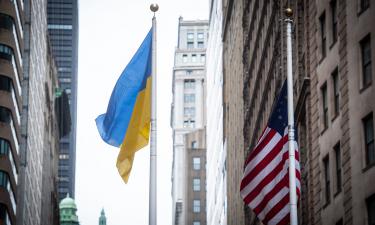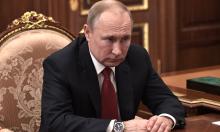Olympic Games for Britain
After six minutes of superhuman effort over 2,000 metres, Britain's rowers made Olympic history yesterday when they clinched gold by just six inches and eight-hundredths of a second in one of the most dramatic races ever seen. Matthew Pinsent's usually calm demeanour dissolved when he burst into tears after entering the pantheon of British sporting legends by winning his fourth successive Olympic gold medal as part of the crew in the men's four that pipped their Canadian rivals on the line with an amazing last-gasp surge. Narrowly in front for the first 1,500m, the British quartet of Pinsent, James Cracknell, Steve Williams and Ed Coode was suddenly overtaken with 500m to go but recovered to steal victory in an amazing photo finish. Confusion reigned for 30 agonising seconds before officials confirmed Britain as the winners. Their winning time of six minutes and 6.98 seconds was just 0.08 seconds faster than the Canadians, the reigning world champions, whose time was 6:07:06. 'When we crossed the bow balls, I didn't think we'd won,' said Pinsent, the team's stroke. 'It was so tight. They shouted over to us, "Who won? Who won?" Nobody knew. But then we saw all the Union Jacks go up on the left.' The team's early morning victory was the highlight of an extraordinary day which saw Britain achieve its biggest ever Olympic medal haul in a single day of competition. Yesterday Britain's rowers, sailors, cyclists and equestrian eventers between them won nine medals - four golds, three silvers and two bronzes - to take the country's medal tally to 17 so far, informs the Observer. According to Times Online, a race fit for the Gods and another British oarsman ascending Mount Olympus. No less than Steve Redgrave in Sydney four years ago, this was Matthew Pinsent’s finest hour. On the water and off it. No more can he be termed aloof or arrogant nor accused of being an athlete who kept the best for himself. Every last pound of his considerable frame, every last ounce of his energy, relief and emotion were revealed on Lake Schinias yesterday. When Pinsent rows, as he did for his life through the last seconds of a gripping duel with the Canadians, an elemental force is unleashed; when he cries, the plains flood. On the rostrum clasping his fourth gold medal against a backdrop of Union Jacks and with the cheers of the British supporters still ringing down the course, Pinsent was inconsolable. Suddenly, the Old Etonian reserve was stripped bare, the aloofness that masks a complex soul was consigned to the gentle cooling breeze. Like the ancient Olympians, Pinsent was left naked, crying like a child at the sheer desperate magnitude of his achievement. He had given everything just as his crew had asked of him, just as Jurgen Grobler, his long-time mentor and head coach of the men’s team, had demanded at the team meeting on the eve of battle.
Pinsent himself tells a good story about his 1992 gold with Redgrave, his first. Through all of the build-up he had waited to hear Grobler’s inspirational team talk. He waited in vain until Grobler pushed the boat out for the last time. “Matthew,” he said in those deep Germanic tones. “I think we win.” This time his message was different, but no less effective. “Matthew, you are the leader, you can win the medal, the others will do everything for you.” On an extraordinary day for Great Britain at the Olympics the gold-medal tally rose to six, thanks to outstanding performances from Matthew Pinsent's coxless four, yachtsman Ben Ainslie and cyclist Bradley Wiggins. One gold even arrived three days late when Leslie Law was promoted from second to first place in the individual three-day eventing after a successful appeal to the Court of Arbitration in Sport that the original winner, the German rider Bettina Hoy, had breached the rules by crossing the start-line twice. Simon Clegg, chief executive of the British Olympic Association who had said that the team's target was six golds, was moved to say: "This is Britain's greatest-ever day in Olympic history." The day had begun with a breakfast-time gold when Pinsent, James Cracknell, Ed Coode and Steve Williams won the coxless four by the margin of 0.08sec - a result so close that a photo-finish was called for. For Pinsent it was his fourth gold in successive Olympics, one behind his watching former team-mate Sir Steve Redgrave. The next success was Ainslie who completed a courageous comeback to win the Finn class a week after a disqualification in one race had seemed to destroy his chances of gold. And the golden haul was rounded off by Wiggins who won the men's individual pursuit title from the Australian Brad McGee, with fellow Briton Rob Hayles fourth. But the most unusual success had to be Law who was told of his medal promotion while riding at the Solihull Horse Trials and professed himself "shocked and stunned" to hear of the upgrade. A joint appeal by the British, French and US went to the CAS after the sport's governing body had failed to disqualify Hoy in the showjumping phase. The ruling by the CAS meant a change in the individual medal rankings, which now read: Gold (Law), Silver (Kim Sevenson, US), Bronze (Pippa Funnell, GB - who had been placed fourth). Germany also lost in the team event with the first three now being France, Britain and the US. Law, who is 39 and lives in Worcestershire, became the first Briton to win an equestrian gold since Richard Meade in 1972. He said last night: "I am very excited. I am overwhelmed. I have tried not to think too much about it. Yogi Breisner, our team manager in Athens, phoned me and soon afterwards it was announced to the spectators at Solihull, reports Telegraph.
Read earlier news stories by PRAVDA.Ru &to=http:// english.pravda.ru/sport/2001/11/02/19975.html ' target=_blank> Pravda.RU At 2002 Winter Olympics Russians To Perform As ...
Subscribe to Pravda.Ru Telegram channel, Facebook, RSS!



